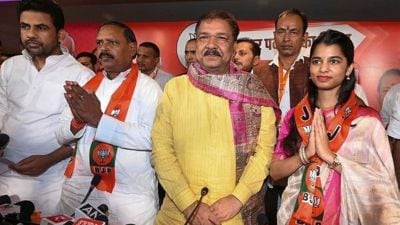Retreat to advance
The election results have been good for the BJP, but not good enough. It is ironic that when for the first time it comes to having its leade...

The election results have been good for the BJP, but not good enough. It is ironic that when for the first time it comes to having its leader as a Prime Minister who need not be a caricature of a person in power, it is hamstrung by alliances.
The irony is the essence. To put it sharply but not falsely, the BJP has alliances but no allies. At best, it has a solitary ally — the Shiv Sena. Even these alliances do not add up to an alliance, not even one as loose and conflict-prone as the late unlamented United Front.
This situation has come about because the BJP was itself ambiguous about its identity. It is the political arm of the RSS, nothing more and nothing less. The Nagpur headquarters does not control openly and rudely as Bal Thackeray does in Maharashtra. It controls through ideology.
The ideological bond is not just that of common belief in communalised Hinduism. It is also a belief in hierarchy, centralism and obedience. It is further a belief in the supremacy of power and its indispensability inthe struggle to establish the supremacy of sectarian and authoritarian Hindutva.
Vajpayee, Advani and Joshi may disagree on a multitude of matters but on this basic ideological structure their views would be identical. The BJP does not concede itself the right to exist without this basic ideological steel frame.
The BJP leadership did not err in its tactics. Its strategy was to use separate alliances in different states to push up the overall tally of seats of the BJP itself so that it could come near enough to the majority threshold. It hoped to be able to cross that threshold mainly on the basis of its own strength and those of its one ally — the Shiv Sena.
The BJP leadership hoped to secure more seats than it did in UP, Rajasthan, Bihar, Maharashtra and Madhya Pradesh. It secured more seats than it hoped for or, rather, its ally in each particular state did, in Tamil Nadu, Andhra Pradesh, Karnataka, Orissa, Punjab and West Bengal. The BJP has made headway in the states where its ally was the chiefgainer, but not to any spectacular extent. Without the ally concerned, it would still have made some gains.
The BJP did not lose its so-called untouchability chiefly because of its allies. It broke out of its ghetto for two reasons. The first is that especially for the younger generation, who now constitute two-thirds of the electorate, communalism is not necessarily evil. They have to be educated and persuaded on this point. They are for the BJP because they regard it as the party of Hindutva, their sword and shield against the Muslims. The second is that large sections of the middle strata in those states where its administrative inadequacies are not known at first hand wanted to give the BJP a chance.
The BJP could advance only if it had an identity. At the same time, it knew that to win Delhi a new and different identity had to be presented. There can be no doubt that if it is able to settle down in government, it will try to convert state power into an instrument to remake the Republic of India inthe image of Guruji Golwalkar’s Bunch of Thoughts. It would not regard this as a subversion but as the completion of the freedom movement by making the Republic truly representative of the faith of the majority. This is where the danger to the Indian Constitution and republic lies. Incidentally, this was the conclusion to which the late Madhu Limaye came on the basis of his experience with the Jan Sangh when it was a component of the Janata Party in 1977-79.
This central problem of the BJP is sought to be covered up by the alarm raised over the `dependency syndrome’. No doubt the BJP cannot run the government without allies. Since most of them have nothing in common with each other or the BJP except the shared desire to have central ministerial berths, each is pressing his or her claims for portfolios and programmes that would raise their regional electoral fortunes. The BJP, as the largest party in what can only be called an arrangement of parties, has to be the arbitrator and the giver of gifts. This isnot due to its aroused sense of charity but in order to get the greatest gift of all — power.
Whether it be the AIADMK or the Trinamool Congress, what they give will be peanuts compared to what yielding to their demands will give the BJP — control of the levers of state power. If they are not aware of this, the battle-hardened RSS-moulded BJP leaders certainly are. In fact, the ease with which these demands are being conceded is the most alarming manifestation of the aims of these leaders. They know that a government made up of such discordant elements does not have the ghost of a chance of providing stability. It can, however, place persons in key positions of the state, pull down governments and structures that come in its way and lay the basis for a total takeover in the near future. This is not to be the real bari for Atal Behari, or whoever the BJP chooses to project as its next leader. Anyway, the best laid plans may go awry if the Congress and the Left play their role of vigilant, active andunited defenders of secularism and democracy.
The snag is the lack of understanding and compatibility of these two formations on economic issues. The Congress and the Left have never really discussed this issue among themselves. They have talked at each other, not to each other. The Left has to shoulder a greater portion of the blame. Not only have its governments in the states implemented programmes which are in essence the same as those of the central government, they have done next to nothing to alter the basic orientation of Chidambaram’s `dream budget’. All they did was to press sectional demands of better-paid workers and employers and place heavy burdens on budgetary resources. Few among those whose case the Left so passionately pleads stand by it politically, much less ideologically. As some Left trade union leaders themselves cynically say their followers are, in fact, their employers. If the leaders do not secure them what they want they are retrenched! This is a pitiful state for the trade unionmovement to be reduced to.
The Congress, too, would have to spell out more concretely its immediate economic programme: what reforms would be immediately on its agenda and what its proposals are for tackling poverty and unemployment. Its attitude to planning and the public sector have also to be discussed and clarified.
They cannot afford to wait, nor confine themselves to blowing the bugle of secularism. Least of all, they should not imagine that the `dependency factor’ will prevent the BJP juggernaut from rolling on.





- 0120 hours ago
- 0220 hours ago
- 0320 hours ago
- 0420 hours ago
- 0520 hours ago


























